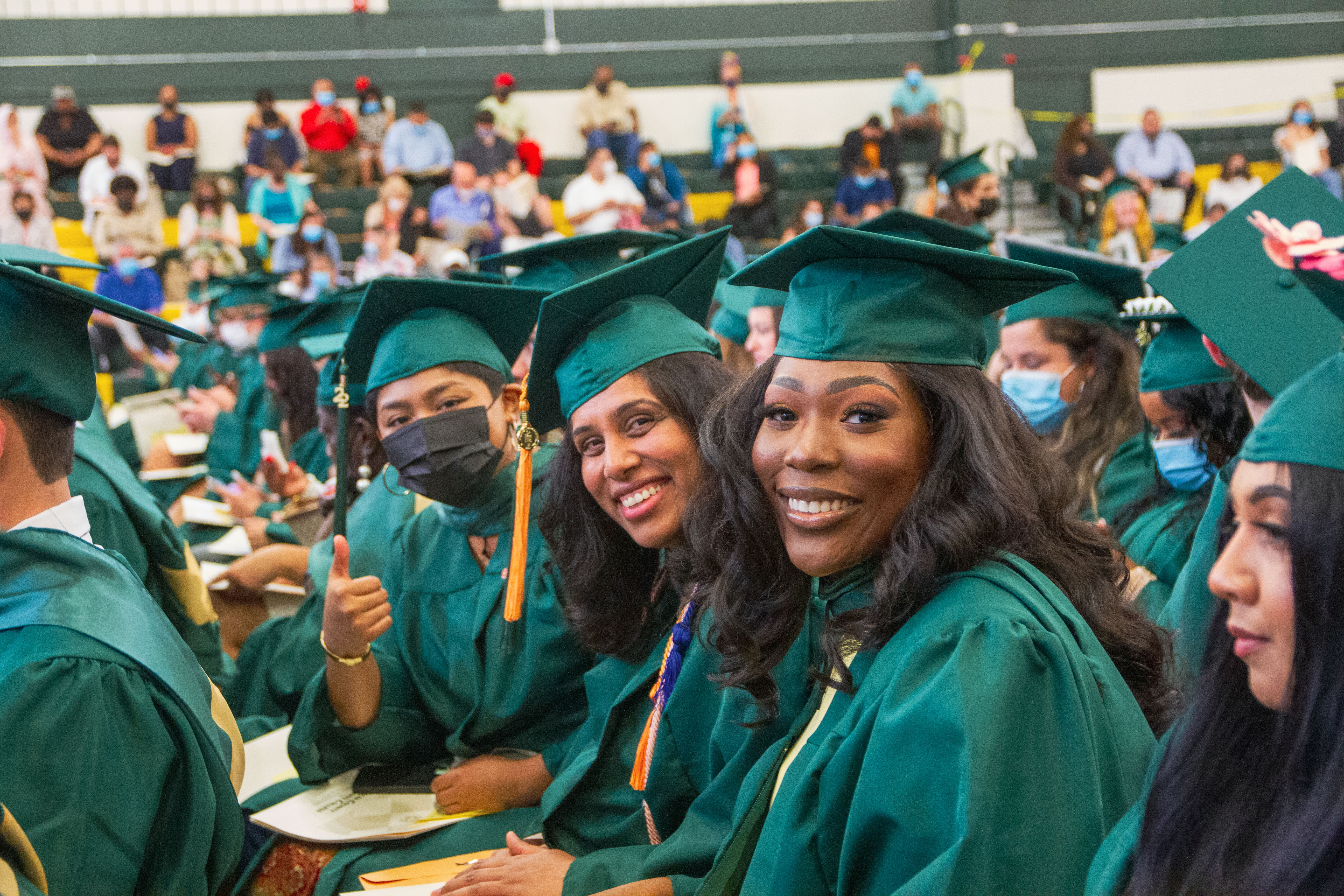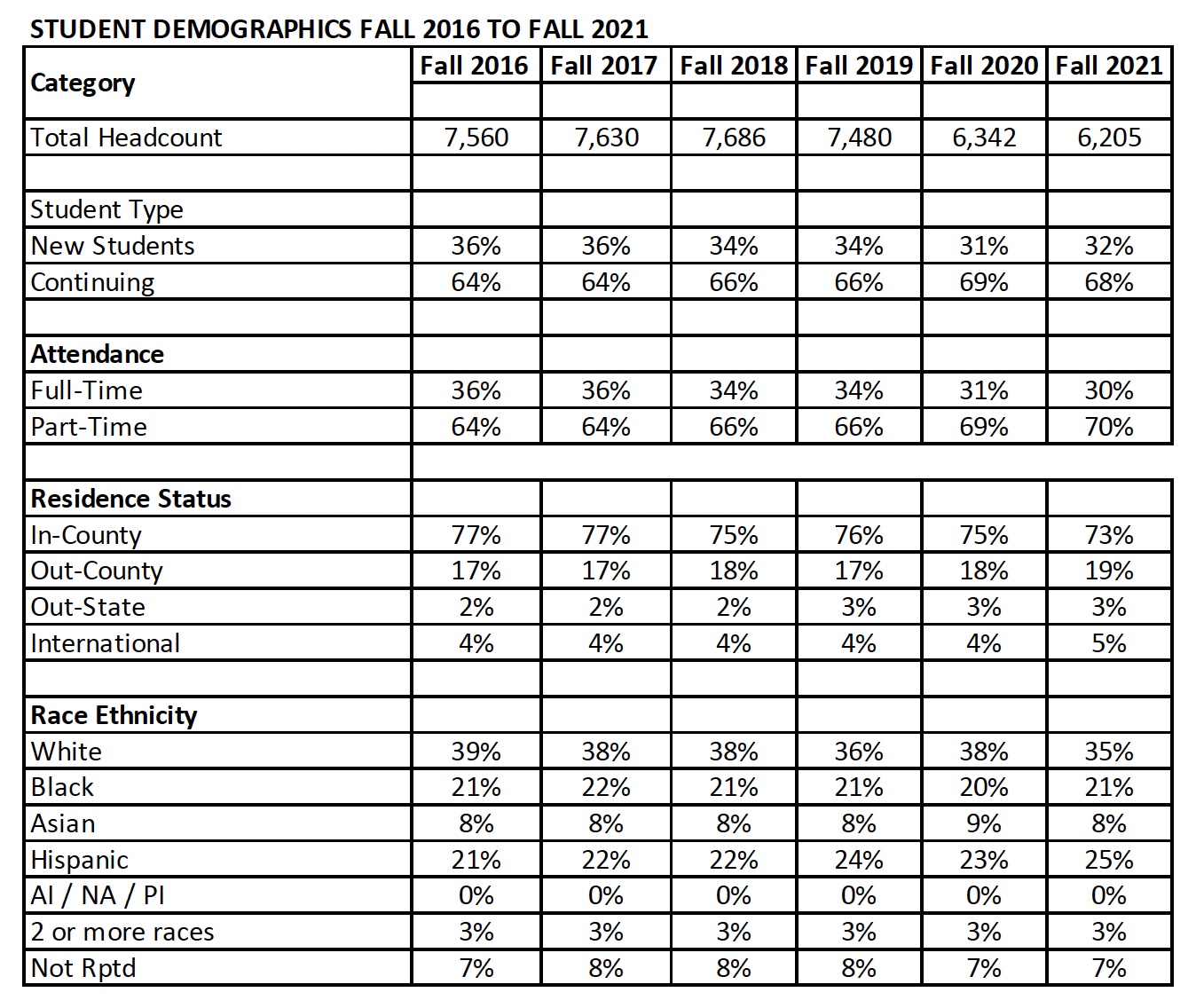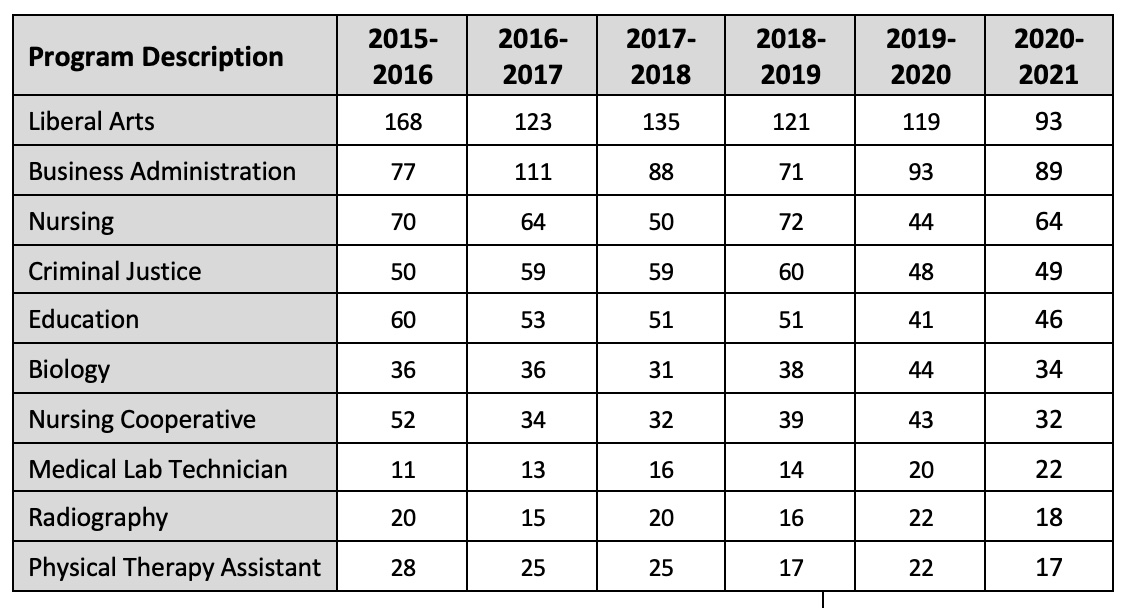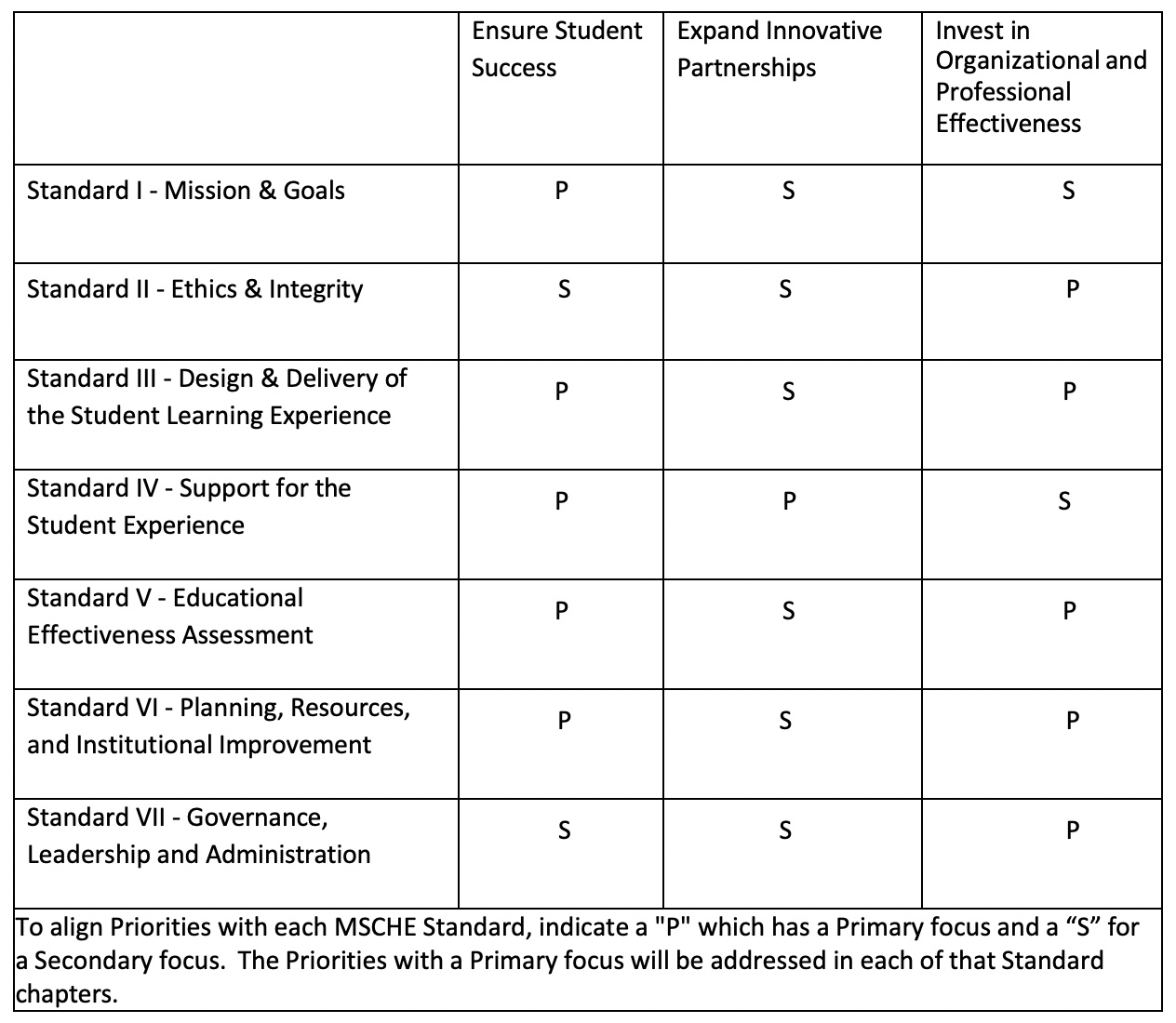Middle States Accreditation Self-Study
Mercer County Community College is accredited through the Middle States Commission on Higher Education. On a regular basis, the College undergoes a re-accreditation process to ensure all appropriate measures are in place to provide the highest level of educational opportunities to all its students. The Middle States Commission on Higher Education's standards of accreditation are used throughout the self-student process, resulting in a report that has been compiled by the findings of over 100 staff and faculty.
Preparing for the Middle States Visit
November Town Hall Presentation
Click hereto Open (PDF)
(MLink login)

Institutional Overview
Mercer County Community College (MCCC) is a publicly assisted co-educational institution of higher education that provides quality programs and services at a reasonable cost. Funding is secured through state support (distributed among the various New Jersey community colleges according to enrollment), annual county allocation, student tuition and fees, and supplemental grants. The college offers associate degrees and certificates in over 75 program areas and is currently exploring the addition of several certificates. The Division of Life Long Learning (DLL) offers a range of non-credit programs and course offerings for the community through our Center for Continuing Studies (CSS) and The Mercer Institute of Management and Technology Training (MI). The Center for Continuing Studies provides non-credit personal and professional development courses while The Mercer Institute provides a full range of customizable training for businesses and industries throughout the region.
With a campus in West Windsor and a location in downtown Trenton (the state’s capital), Mercer operates under a one-college philosophy that ensures equitable educational opportunities and services to all students. Full-time faculty members teach both day and evening courses at the West Windsor campus and James Kerney campus. Academic divisions and support-service departments serve students at both campuses and are responsible for day, evening, and weekend students as well as those who enroll in online courses via Mercer Online.
In keeping with the College’s commitment to enhanced retention and completion, the College revitalized its Guided Pathways to Success (GPS) initiative, indexing degree curriculum mapping efforts to the NJ Council of County College Center for Student Success 5-year implementation plan. During the 2018-2019 academic year, 100% of degree program curriculum mapping was achieved, and during the 2019-2020 academic year, we re-mapped these programs to meet the 60-credit initiative keeping all Associated degrees at 60 credits with exception of some externally accredited programs, which require more. Additionally, we focused on strengthening our current programming and implementing the Multiple Measures placement testing here at MCCC with both English and Math departments embracing a multiple measures approach to placement.
To better serve our students and businesses, Mercer County Community College continues to strengthen our 10 innovative partnerships with regional businesses that provide paid and academically meaningful internships for Mercer students while they pursue their degree or certificate programs at Mercer. Students who need supplementary income while attending Mercer benefit from the meaningful job experience they get while earning, strengthening their backgrounds and job skills. Most of these partnerships include either a promise of employment at the partnering business or access to networks of employers in some of the in-demand occupations today. Our partners also participate in teaching staff or providing lab teaching at the Partner’s locations.
As part of our strategic plan, Academic Affairs completed a comprehensive five-year Education Master Plan that will inform teaching, learning, student advisement, and educational systems through 2022. In anticipation of the new strategic plan, the Academic Affairs division plans to meet early summer to re-align the Education Master Plan to the new set of strategic goals.
The MCCC University Center is scheduled to be expanded by 200% with the budget approved by the County. This will allow students to continue their studies at the Bachelor’s and Master’s degree level with our on-campus partners -- Fairleigh Dickinson University, Felician College,
Rutgers University and William Paterson University. The most recent addition to MCCC’s University Partnerships is Wilmington University. Wilmington University will offer degree programs in three majors in Trenton and West Windsor: Criminal Justice, Media Design, and a Master’s of Education degree in School Leadership. Eventually the bachelor’s degree program will be expanded to include Health Sciences and Software Design.
A brief introduction to MCCC students is listed below:
- Approximately 9,000 students enroll in one or more credit courses each
- Mercer County residents comprise three-fourths of the student population
- International students (non-immigrant), contributing to a diverse student population, represent more than 40 countries.
- Enrollment includes 70% part-time students, 30% full-time; 44% men and 56% women
- The average age of a full-time student is 22; part-time 26
- Average student/faculty ratio: 16 to 1
- More than 50% of Mercer's graduates transfer to senior colleges
- More student demographics trends are listed in Table 1 below
- The highest number of degrees conferred over a five year period is shown in Table 2 below
Table 1: Student Demographics Fall 2016 to Fall 2021

Table 2: Highest Number of Degrees Award
Table 2 indicates the highest number of degrees award from academic years 2015-2020. The number is sorted in academic year 2020-2021.

Mission Statement
Mercer County Community College is a comprehensive, publicly supported two-year institution focused on learning and student success. The college welcomes students of all ages from a wide variety of backgrounds, abilities, interests, levels of education, and economic circumstances to a challenging and supportive environment dedicated to meeting the educational needs of 21st century global citizens and lifelong learners. Mercer responds to a broad array of community needs, offering programs and services for employers, continuing education and training for the workforce, enrichment for youth, and cultural opportunities for people in the region.
Vision Statement
A vital college, engaged with its community and dedicated above all else to student success.
Institutional Goals
Goal #1: Ensure Student Success
Student success, defined as occurring when students accomplish their goals, will become increasingly critical at Mercer County Community College. The college has a long history of providing affordable access to educational opportunities including transfer programs, career and technical programs, and general education, as well as classes and learning experiences pursued by learners who may or may not seek academic credentials or transfer. The college affirms the commitment to open access and affordability while also recognizing that access
alone is no longer sufficient; rather, ensuring success and completion is critical for students who increasingly require college credentials or degrees for employment and civic engagement in the global knowledge economy.
Goal #2: Expand Innovative Partnerships
Mercer County Community College has developed many partnerships with local school districts, four-year institutions, businesses, government agencies, community organizations, international educators, and other entities. We acknowledge the importance of our existing partnerships while realizing the need to pursue new and innovative partnerships that are critical in achieving our strategic goals. These partnerships will impact student success by increasing affordability, access, and support for new students who may not have considered higher education. Innovative partnerships can also provide vital connections for student internships and post-completion jobs. Those partnerships will play a vital role in better preparing our graduates for new economic realities. New and innovative avenues of cooperation and expanded engagement with existing partners can also result in new and improved pathways for better student learning outcomes in courses and programs that accelerate completion and transfer rates. In addition, these pathways can help the college and its graduates to directly address labor market needs and contribute to a better prepared workforce.
Goal #3: Invest in Organizational and Professional Effectiveness
An effective college is one that invests in its most valuable assets: human resources –faculty, staff, and administrators. Professional and organizational development for faculty, staff, and administrators ensures the development of innovative practices, overall institutional effectiveness, and ultimately student success. Professional development designed for the college’s students, and occurring both inside and outside the classroom, can provide valuable learning opportunities to accelerate students’ successful degree completion and subsequent entry into employment and/or transfer. MCCC will leverage these important resources to empower faculty and staff to contribute fully to the achievement of its strategic goals.
https://www.mccc.edu/pdf/strategic_plan_16-21.pdf
Institutional Priorities to be Addressed in the Self-Study
The three Institutional Priorities listed above were identified during the 2015-2016 Strategic Planning development. During the recent strategic planning process and development, it was evident that the three strategic goals will remain the same. While the goals/priorities are the same, multiple strategic initiatives have been identified and will be implemented for the upcoming 2021-2026 Strategic Plan. For the previous and current strategic planning processes, input and recommendations were received from strategic planning task forces, campus community open sessions, President’s Leadership Team (PLT), and Board of Trustees.
Table 3 and Table 4 listed below the alignment of MCCC’s Mission and MCCC’s Institutional Priorities and the alignment of MSCHE Standards and MCCC’s Institutional Priorities respectively.
Table 3: Alignment of Mission with Institutional Priorities

Table 4: Alignment of MSCHE Standards with Institutional Priorities
